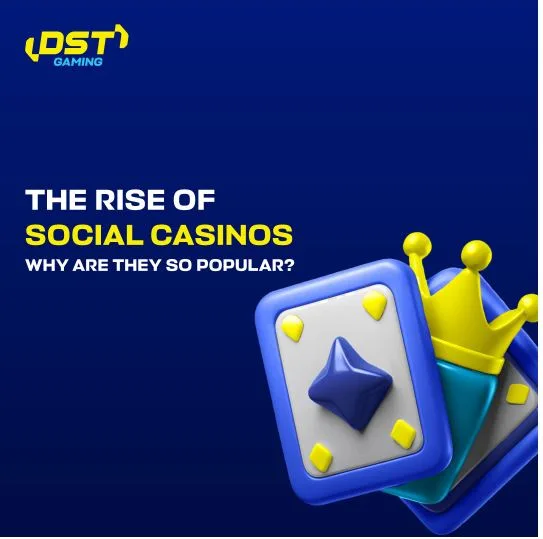The Rise of Social Casinos: Why Are They So Popular?
These days, millions of people around the world are spending their free time playing games on social casino platforms. While there’s no real-money gambling involved, these games offer all the classic favorites—poker, blackjack, slots, and more. Instead of betting cash, players use virtual coins, and any rewards they earn stay within the game.
What’s interesting is that social casinos are booming, even without cash prizes. This isn’t just a passing trend—it’s part of a bigger shift in how people enjoy digital entertainment. More and more, players are drawn to games that are easy to access, fun, and low-pressure.
So, what’s really driving this rising interest? Let’s take a closer look at why social casinos are winning players over.
No Financial Risk, Just Fun
Their popularity comes mainly from their lack of financial risk. Unlike standard online casinos, social casino games do not require real-money wagers. Usually, players get virtual money for free or have the choice to buy more for fun or convenience.
This model eliminates the fear of losing money, which lets players enjoy the excitement of the game free from financial consequences. It appeals primarily to casual users looking for light entertainment instead of high-stakes gambling.
Mobile-First Access Enhances Convenience
Another driving factor is social casinos’ mobile friendliness. Often accessible as apps or responsive browser versions, these games are easy to play on the go.
DSTGAMING is one of several casino software companies that offer mobile-ready white label solutions that enable operators to reach users across multiple devices. This level of convenience makes social casinos especially attractive to those who want to play during quick breaks or while in transit.
The Social Component Boosts Engagement
Beyond entertainment value, social casinos encourage interaction. Many platforms include features such as friend lists, chat options, leaderboards, and multiplayer modes. These social features build online communities and change gaming into a shared experience.
The sense of connection was vital during the COVID-19 outbreak when many people turned to virtual ways of social interaction. Social casinos provided a digital meeting point as well as entertainment value during periods of isolation.
Broad Reach and Fewer Regulatory Barriers
Social casinos often operate outside conventional gambling regulations since they do not include real-money betting. This enables operators to offer their services in regions where online gambling might otherwise face restrictions.
Game software providers like DSTGAMING help operators take advantage of these opportunities by supplying scalable infrastructure supporting compliance across several jurisdictions. This legal flexibility has promoted quick expansion into previously unexplored markets.
Monetization Through Optional Purchases
Although entry is free, many social casinos operate using a freemium model. Advertising and in-app purchases are used to generate income rather than wagers. Although players can buy virtual currency, cosmetic items, or gain access to exclusive features, the core gameplay remains accessible to everyone.
Widely employed in mobile games, this model has proven successful in generating consistent income while preserving a user-friendly experience.
Frequent Updates Keep Players Coming Back
Social casinos rely on new, engaging content to retain users. Regular updates with new themes, mini-games, seasonal events, or limited-time challenges keep the gameplay dynamic and captivating.
Backend support for these updates, such as aggregator APIs, which providers like DSTGAMING offer, allows operators to quickly and efficiently refresh game catalogs. This feature means that users always get something new to discover.
Player Retention Through Gamified Rewards
Social casinos encourage regular play with various rewards. Even without real money wins, daily bonuses, loyalty prizes, and achievement milestones give players that sense of achievement.
Robust back-end tools support these gamification techniques. Supported by software providers such as DSTGAMING, certain social casinos take advantage of built-in reward systems to simplify user retention strategies.
A Low-Stakes Introduction to iGaming
Interestingly, some people start with social casinos and then move to real-money gambling. These platforms might serve as a comfortable starting point for players to familiarize themselves with game strategy and mechanics.
Some social casinos feature advertising or links to regulated real-money platforms. Proper integration, something made possible by online casino software providers, allows social casinos as well to transition smoothly to becoming real-money casino platforms.
For a detailed article on the factors driving the rise of social casinos, check out this DSTGAMING original post.
Conclusion
Social casinos offer a compelling blend of low-risk entertainment, social interaction, and on-the-go convenience. Their ability to provide a fun, engaging experience without financial stakes makes them especially attractive to a wide range of players—from casual gamers to seasoned casino fans. This universal appeal cuts across countries, age groups, and lifestyles.
As highlighted above, the growing popularity of social casinos is fueled by accessibility, community features, and a pressure-free gaming environment. These platforms are not just games—they’ve become a part of modern digital culture, offering players a space to relax, connect, and enjoy the thrill of classic casino gameplay without the risks of real gambling.
In an age where entertainment is increasingly digital and personalized, social casinos are carving out a strong, lasting presence—and that momentum shows no sign of slowing down.





